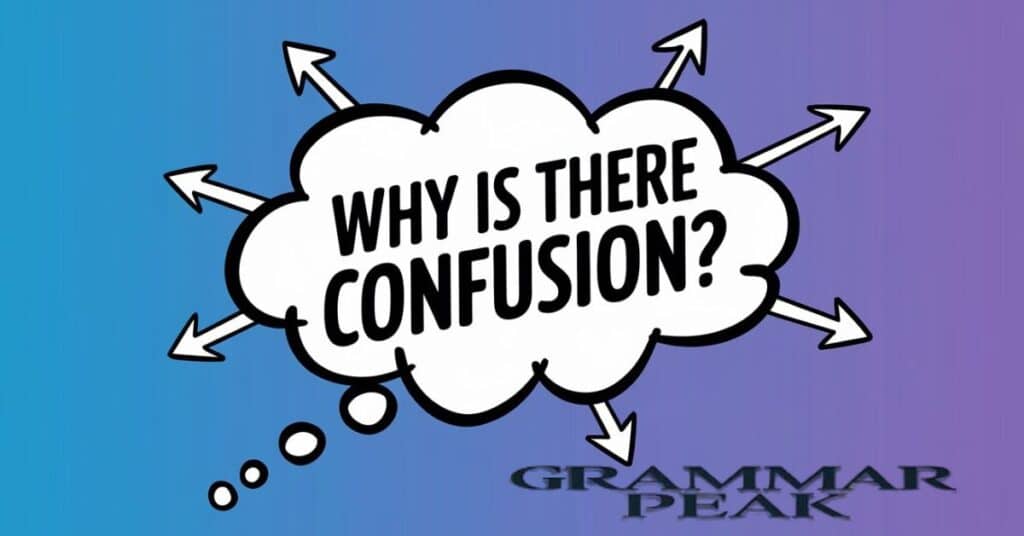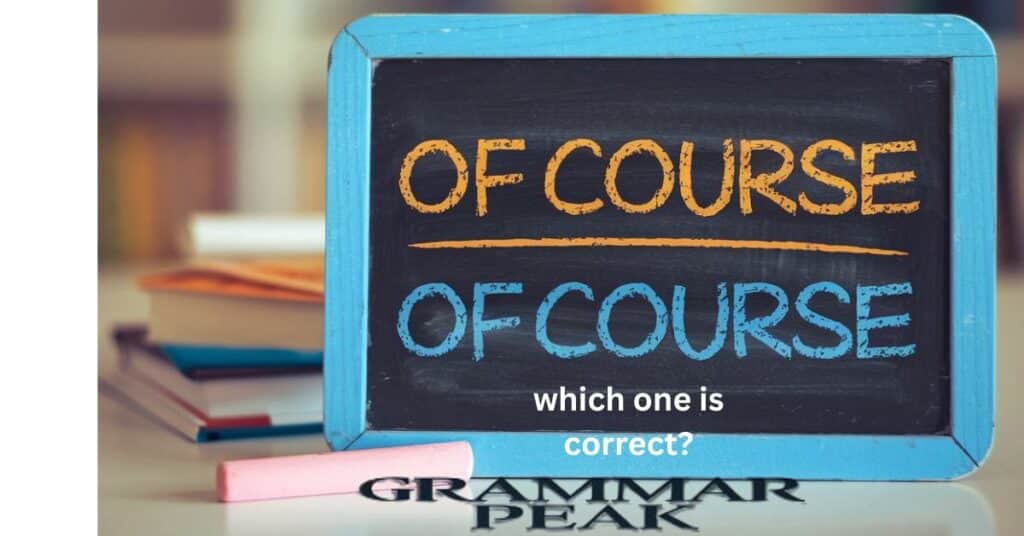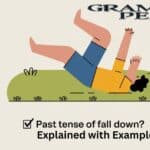The beauty of the English language is partly found in its paradox, and “Of Course” is not exempt. Many ask, “Of Course or Ofcourse: Which One Should You Use?”. In this article, we demystify this conundrum, instructing you on
How to use “Of Course” properly and explaining why “Ofcause” is often misspelled in English. Knowing proper English writing comes in handy whether you are writing an email, a novel, or merely texting a friend. Let us now turn to this common English grammar tip so you can set sail in proper communication.
Why is There Confusion?

The confusion between “Of Course” and “Ofcourse” primarily stems from how we speak. When we talk, we tend to blend words, particularly in common phrases. The phrase “Of Course” often sounds like “Ofcourse” when sputtered, leading to the common writing error of merging the two words.
Another reason for the confusion is the lack of awareness about the mistake. Some people don’t realize that “Ofcourse” is not a valid word in English expressions. They may have seen the incorrect form used elsewhere and assumed it was correct, perpetuating the error in their writing.
While it might seem like a trivial issue, using “Ofcourse” instead of “Of Course” can affect the professionalism and accuracy of your writing. It’s one of those small details that can make a big difference, especially in formal or professional writing. Understanding the correct usage of “Of Course” helps avoid this common writing error and improves the clarity and quality of your communication.
You Might Be Of Course or Ofcourse: Which One Should You Use?
What Do “Of Course” and “Ofcourse” Mean?
The phrase “Of Course” is a standard English usage that signifies agreement or the obviousness of a fact. It is used to express certainty or to politely respond to a request. On the other hand, “Ofcourse” is not recognized in English grammar. It’s a misspelling that has become common due to the reasons mentioned above.
“Of Course”
“Of Course” is a versatile phrase used in various contexts. It can be used to affirm a statement, respond to a request, or indicate that something is expected or obvious. For example, in response to a request like “Can you help me with this?”, one might say, “Of course, I’d be happy to help.”
“Ofcourse”
As mentioned earlier, “Ofcourse” is not a proper form of the phrase. It’s a common mistake in English writing, and using it can detract from your writing’s professionalism and accuracy. Always remember to separate the two words: “Of Course”.
| Phrase | Correctness | Meaning |
| “Of Course” | Correct | Used to express certainty, agreement, or obviousness. |
| “Ofcourse” | Incorrect | Common misspelling of “Of Course”. |
You will like Of Course or Ofcourse: Which One Should You Use?
Synonyms and Similar Terms to “Of Course”
- “Absolutely, I agree with your point of view.”
- “She will definitely be attending the seminar next week.”
- “Certainly, I can help you with that project.”
- “He was undoubtedly the best candidate for the promotion.”
- “I surely can’t miss the opportunity to visit that renowned art exhibition.”
- “The results of the experiment were unquestionably interesting.”
- “Indubitably, this approach will yield better results in the long run.”
- “She assuredly has a knack for solving complex math problems.”
- “Indeed, it’s a great day for a picnic in the park.”
- “The new policy will positively impact the working conditions.”
Each of these sentences uses a synonym or similar term to “Of Course”, showcasing the variety of ways to express certainty or agreement in English.
When and How to Use “Of Course”
The phrase “Of Course” is versatile and can be used in a wide array of contexts. Here are a few examples to illustrate its proper use:
- Of Course as an Affirmation: If someone asks, “Do you remember our first date?” you can respond, “Of course, I remember it like it was yesterday.”
- Of Course in Agreement: When someone says, “This is the best pizza in town,” you can agree by saying, “Of course, nothing else compares!”
- Of Course as a Polite Response: If someone requests, “Could you pass the salt?” you can reply, “Of course,” as you hand them the salt.
- Of Course in Expressing the Obvious: For instance, “Of course the sun sets in the west.”
- Of Course in Giving Permission: If someone asks, “Can I use your phone?” you can permit them by saying, “Of course, feel free.”
- Of Course in Conceding a Point: In a debate, you might say, “Of course, your argument has some valid points.”
These examples show that “Of Course” can be used in different situations to communicate agreement, affirmation, obviousness, and more. However, it’s crucial to be aware of the tone and context, as it can sometimes come across as sarcastic or condescending if not used appropriately.
Examples of ‘Of Course’ in Sentences
- “Of course, I remember when we first met. It was a day to remember.”
- “She said she would finish the project on time, of course.”
- “Of course, you’re right. I should have listened to your advice.”
- “He agreed to help with the preparations, of course.”
- “Of course, the keys are right where you left them.”
- “I will be attending the conference, of course.”
- “The sun sets in the west, of course.”
- “Of course, I’d love to join you for a cup of coffee.”
- “She has a great sense of style, of course.”
- “Of course, I’ll bring the dessert for the party.”
- “We are thrilled about the new project, of course.”
- “Of course, we can schedule another meeting if this time doesn’t work for you.”
These sentences show how the phrase “Of Course” can be naturally incorporated into a variety of situations, highlighting its versatility in English language expressions.
Origins of “Of Course”
“Of Course”
The phrase “Of Course” traces its roots back to the 16th century, predominantly used in the context of horse racing. The term originally referred to the ‘course’ or route that a race would follow.
So, when a horse was said to run ‘of course’, it meant that the horse was running along the expected or predetermined route. Over time, the phrase evolved and took on a metaphorical meaning. Today, it is used to signify that something is expected, obvious, or certain in any scenario, not just in the realm of horse racing.
“Ofcourse”
The term “Ofcourse” is a common misspelling of the phrase “Of Course”. Despite its widespread use, “Ofcourse” is not recognized as a correct term in English. The confusion comes from the tendency to blend words in spoken language, leading to the mistaken belief that “Ofcourse” is a single word.
However, the correct form is two separate words, “Of Course”, originating from the 16th century, where it was used in the context of horse racing.
FAQ” S
Is “Ofcourse” a word in English?
No, “Ofcourse” is not a recognized word in English. The correct phrase is “Of Course”.
Can “Of Course” be used to start a sentence?
Yes, “Of Course” can be used to start a sentence. For example, “Of course, you’re right about that.”
What are some synonyms for “Of Course”?
Some synonyms for “Of Course” include “Certainly”, “Absolutely”, “Definitely”, and “Surely”.
Is it rude to say “Of Course”?
Generally, “Of Course” is not considered rude. However, the tone and context can affect its interpretation.
What is the origin of the phrase “Of Course”?
The phrase “Of Course” originated in the 16th century and was initially used to refer to following a preset or ‘natural’ course or path.
Conclusion
In summary, “Of Course” is the correct phrase to use in your writing and conversation. Remember, “Ofcourse” is a common writing error and should be avoided for clear writing and effective communication. By understanding the proper usage of “Of Course,” you can improve your English language expressions and avoid common spelling mistakes.

Mason Blake is an experienced blogger with a passion for language and communication. With years of expertise in crafting informative and engaging content, Mason shares valuable insights on grammar and writing. His clear, concise, and reader-friendly approach has earned him a loyal following, helping readers sharpen their language skills and master the art of effective communication.








Your article helped me a lot, is there any more related content? Thanks!
Thank you for your sharing. I am worried that I lack creative ideas. It is your article that makes me full of hope. Thank you. But, I have a question, can you help me? https://www.binance.com/ru/register?ref=V3MG69RO
Your point of view caught my eye and was very interesting. Thanks. I have a question for you. https://www.binance.info/lv/register?ref=B4EPR6J0
I don’t think the title of your article matches the content lol. Just kidding, mainly because I had some doubts after reading the article. https://www.binance.info/si-LK/register?ref=V2H9AFPY
Thanks for sharing. I read many of your blog posts, cool, your blog is very good. https://www.binance.info/zh-TC/register?ref=VDVEQ78S
When some one searches for his required thing, therefore
he/she desires to be available that in detail, therefore that thing is maintained over here.
Your article helped me a lot, is there any more related content? Thanks!
This was very well laid out and easy to follow.
I appreciate your unique perspective on this.
I hadn’t considered this angle before. It’s refreshing!
Thanks for taking the time to break this down step-by-step.
You really know how to connect with your readers.
Your advice is exactly what I needed right now.
vkkwttpqgkpownwwtslufuywsfundx
10juwf
hi!,I like your writing so a lot! percentage we communicate extra about your article on AOL? I need an expert on this area to solve my problem. Maybe that’s you! Looking ahead to peer you.
I don’t think the title of your article matches the content lol. Just kidding, mainly because I had some doubts after reading the article.
Thanks a bunch for sharing this with all folks you actually understand what you’re talking about! Bookmarked. Kindly additionally discuss with my site =). We can have a link trade agreement between us!
Your point of view caught my eye and was very interesting. Thanks. I have a question for you.